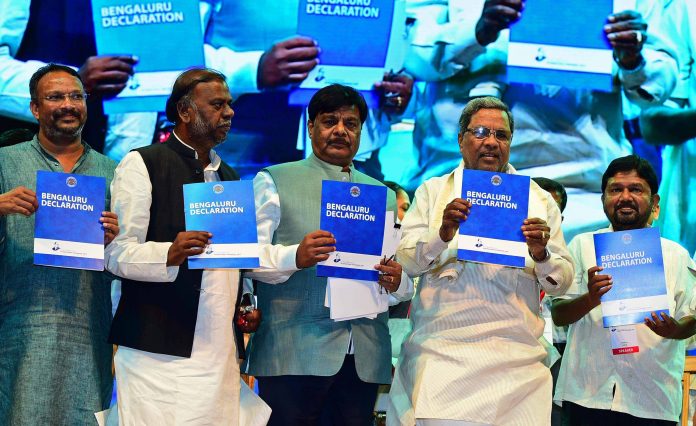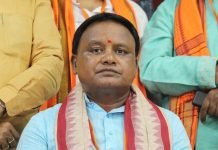Bengaluru: The Dr. B.R. Ambedkar International Conference drew to a closetoday with a resounding response with the launch of The Bengaluru Declaration, a watershed moment for the country. The Declaration earmarks the promise for a new beginning, outlining tangible policies that will redefine the idea of India.
Honorable Chief Minister of Karnataka Shri Siddharamaiah announced the declaration stating “The government is committed to resolve the issue of reservation for SC, ST and oppressed communities in employment and promotion. In this regard, the government has formed a committee led by retired supreme court judges led by Justice Thakur and Justice Gopala Gowda. The report will be discussed with the cabinet and necessary measures taken on war footing to realize Babasaheb Ambedkar’s dream of a progressive India.The government in Karnataka has undertaken the cause of uplifting the minority communities by making the Pourakarmika appointments permanent in a phased manner. So far more than 11000 workers have benefited through this initiative.”
He further added, “Through Bangalore Declaration, we envisage a vision of India that aims to be a dynamic blueprint that addresses the needs and aspirations of all Indians. This is a starting point for an alliance of equity that promotes inclusive growth, social and economic justice for all citizens equally.”
The Conference concluded on a note of debate and hope with many sessions that continued to address the issues that are relevant to the times and pertinent to the political climate in the country.
The session on Constitution of India and Social Justice : The Karnataka Experience/ chaired by Shri Ravivarma Kumar, Senior Advocate and noted constitutional expert, talked about the fact that there is a gap between Law and Justice between words and deeds, as described by Dr. K.S. Vimala, a noted academician.
Dr. Shashi Tharoor, Member of Parliament, stated, “Ours is a constitution clearly written for a plural society and inspired by the spirit of luminaries like Mahatma Gandhi and Dr. Ambedkar. Our constitution recognizes that individual freedoms have to be balanced with group interests without compulsion on social behavior, and that conformity beyond a point is not realistic if you want to preserve a diverse democracy.”
Mr. Jairam Ramesh, Member of Parliament reiterated the need for faster economic growth for meeting social justice. “A slow growing economy cannot meet its social objectives meaningfully. We need socially inclusive policies like those implemented by the UPA government during 2004-2014, resulting in average rate of GDP at 7.7%, he added.”
In the session chaired by Shri Ravivarma Kumar, noted human rights advocate, Shri B.T. Venkatesh talked about how “The basic structure of the Constitution is the debate of the hour. So, what is the basic structure of the Constitution? It is a way to attain social justice through a Court of Law.”
Shri Ajay Gudavarthy, Associate Professor – JNU, during the session on Social Justice and Human Equality talked about applying Rawls’ Theory of Justice and Fairness to reading Babasaheb Ambedkar, finding objective and subject provisions of justice.
Dr. MilindAwad, noted academician, JNU, said, “The ideas of equality and liberty are in place and a foundation has been laid by Babasaheb Ambedkar in our Constitution. However, there is much to be done at the level of implementation. In contemporary times, caste violence and riots occur. Yet, the gaps in the justice system allow perpetrators to go scot-free. Our Courts are unable to penalize the accused, and thus the cycle of oppression continues.”
The session on Re-Polarization of People Movements – chaired by Mr. Rudraswamy saw a debate on consolidation of ideologies that are much needed to lead to a large movement. Mr. G. N. Nagaraj said” We all should fight together without polarization as it was during the times of the Freedom Movement.” Adding weight to the importance of the message was Prof. Narasimahaiah’s statement, “This International Conference can give a message to the whole world. It takes Secular and Socialist messages of Babasaheb Ambedkar to the whole globe.”
During the Research Scholar panel, Mr. Aakash Singh Rathore, Professor of Philosophy, Politics and Law at JNU, talked about the fact that for a democracy to function it needs an administration, which political theory has largely been silent on. The administration represents all members of society. The relationship between morality and politics is complicated. The notion of a good society is a desirable goal, yet morality can impinge on political liberties, such as in the case of cow vigilantism, or regressive prohibitions on women.
Ms. SonamGoyal, IAS, during her session talked about the challenges faced by women that include the two- child norm, which was introduced for a brief period. If a woman had more than two children, she could not be a candidate for election to the panchayat. Independent women sarpanchs face stigma, otherwise when the amendment first came in it was inevitable that husbands took over the job. There are motions for their removal, sexual harassment, and detrimental police nexus with upper caste men.
The session on Social Justice and Social Movements of Karnataka chaired by Mr. K Maralusiddappa, Author and former Chairman of Karnataka Nataka Academy, dwelled on the historical fact of Dalit oppression, with Mr. AravindMalagatti, prominent Dalit poet and writer, saying, “The core reason remains that the ‘thinking’ is the crux and not any other larger external influence.”
Mr. N S Shankar said, “All sections of the population are thinking beings who have free will, irrespective of how numerous they are in population. So, though Dalits may come to power and form a government, it shall be they who need to provide justice by virtue of being in power.”
Mr. Dinesh AminMattu said, “A government’s merit alone must be discussed andcriticized on their inability to deliver justice. Subjects such as religion, nationalism, majoritarianism that invite emotion and not logic of merit should never be part of the discussions.”
The session on Nation-State, Citizenship and Statehood talked about the isolation of self-extending to a group as the chief evil as Dr. B. R. Ambedkar saw it. It was commented that untouchables must establish kinship, as kinship is an antidote to isolation.
Prominent academician Professor Manu Bhagavan said, “Nationalism is both a feeling of kith and kin for those of a favorable kind and nationalism is also the unfavorable kind being seen as not kith and not kin.”-
Talking about the approaches to Study on Dr. B. R. Ambedkar in Karnataka, a Political, Social & Literary Approach chaired by Prof Siddalingaiah, Mr. KumarVeerabhadrappa, renowned Kannada poet, writer, critic and thinker said,“In every country there are 2-3 castes but in our country there are 12,798 castes.”
In a session on Religion and Social Justice chaired by Prof. James Manor, Prof. Kalinga Tudor Silva said, “Dr B. R.Ambedkar attempted to reform the system to create a more equitable society for Dalits but failing this, he explored various other religions until finally settling on Buddhism. His choice of religions was also greatly impacted by his role in the nationalist movement.”
Dr. Raju Shankthivel during his chair on Equality, marginality and affirmative action saw Dr. ChittaranjanSenapati comment, “Privatization of sectors like health and education means the poor cannot afford the benefits of this process. Neoliberalism is regression for the marginalized while it is progress for the majority.”
Prof. Jandhyala B G Tilak, National Institute of Planning and Administration said, “Creating opportunities in higher education institutions for the minorities is essential because a society that educates its minorities is benefitted far more than if they only invested in the already empowered majority. Further, the success of such opportunities should not be judged on the enrolment of the minority youths but rather of the retention of students by such programs.” Adding to this, Prof. Johannes Urpelainenof Columbia University said, “In order to deal with the marginalization of minorities, the government must ensure adequate electoral quotas and must solve the problem of ineffective political mobilization within these communities.”
In a session chaired by Mr. Amit Thorat, Dr. Khalid Khan talked about the institutional problems faced by marginalized groups in terms of how equality does not necessarily mean equity, particularly in terms of education. He also went on to describe the problems created for marginalized groups with the advent of privatization, including the language barrier and the lack of reservation in private industries.
Prof. Amaresh Dubey of JNU,spoke extensively about the issues that surround the deprivation and social mobility of marginalized groups. Mr. G Chandraiah spoke candidly about what he believed to be the problem with discourse of Dalit politics and development that existed today. He detailed the need to modify the view that all SCs or STs represented a homogenous group of people and that for maximum program efficiency, programs should be better targeted, keeping in mind intra-caste disparities.
Many other sessions covered the critical need to explore, discuss and debate the need to highlight the serious problems that continue to plague India and the way forward. One that would need both social conscientiousness and political will to work side by side if the ill effects of minority marginalization are to be removed from society.
The Conference was a tremendous success, with appreciation flowing in from across people from different walks of life and a true tribute to Babasaheb Ambedkar.
-ByOdishaAge



















